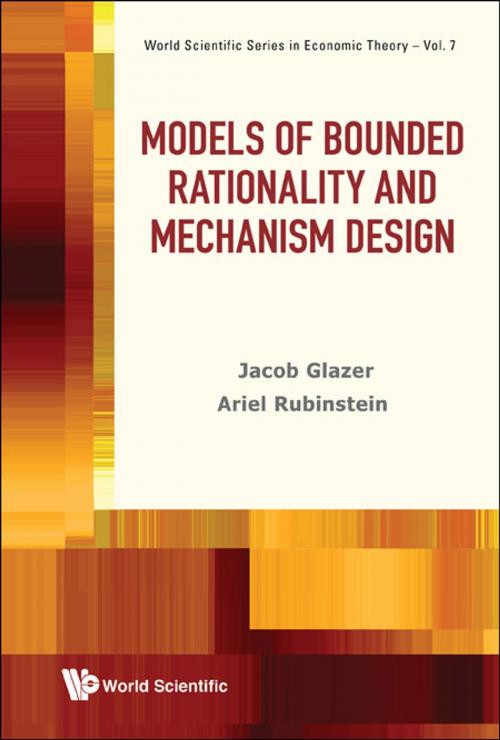Models of Bounded Rationality and Mechanism Design
Business & Finance, Economics, Theory of Economics| Author: | Jacob Glazer, Ariel Rubinstein | ISBN: | 9789813141346 |
| Publisher: | World Scientific Publishing Company | Publication: | August 22, 2016 |
| Imprint: | WSPC | Language: | English |
| Author: | Jacob Glazer, Ariel Rubinstein |
| ISBN: | 9789813141346 |
| Publisher: | World Scientific Publishing Company |
| Publication: | August 22, 2016 |
| Imprint: | WSPC |
| Language: | English |
This book brings together the authors' joint papers from over a period of more than twenty years. The collection includes seven papers, each of which presents a novel and rigorous model in Economic Theory.
All of the models are within the domain of implementation and mechanism design theories. These theories attempt to explain how incentive schemes and organizations can be designed with the goal of inducing agents to behave according to the designer's (principal's) objectives. Most of the literature assumes that agents are fully rational. In contrast, the authors inject into each model an element which conflicts with the standard notion of full rationality, demonstrating how such elements can dramatically change the mechanism design problem.
Although all of the models presented in this volume touch on mechanism design issues, it is the formal modeling of bounded rationality that the authors are most interested in. A model of bounded rationality signifies a model that contains a procedural element of reasoning that is not consistent with full rationality. Rather than looking for a canonical model of bounded rationality, the articles introduce a variety of modeling devices that will capture procedural elements not previously considered, and which alter the analysis of the model.
The book is a journey into the modeling of bounded rationality. It is a collection of modeling ideas rather than a general alternative theory of implementation.
Contents:
- Introduction
- An Extensive Game as a Guide for Solving a Normal Game
- Motives and Implementation: On the Design of Mechanisms to Elicit Opinions
- Debates and Decisions, On a Rationale of Argumentation Rules
- On Optimal Rules of Persuasion
- A Study in the Pragmatics of Persuasion: A Game Theoretical Approach
- A Model of Persuasion with a Boundedly Rational Agents
- Complex Questionnaires
Readership: Graduate and research students of economic theory, professionals in economic theory and behavioral economics.
Key Features:
- Prominent authors
- An approach to mechanism design that considers bounded rationality of agents rather than full rationality
- Formal modeling of bounded rationality
This book brings together the authors' joint papers from over a period of more than twenty years. The collection includes seven papers, each of which presents a novel and rigorous model in Economic Theory.
All of the models are within the domain of implementation and mechanism design theories. These theories attempt to explain how incentive schemes and organizations can be designed with the goal of inducing agents to behave according to the designer's (principal's) objectives. Most of the literature assumes that agents are fully rational. In contrast, the authors inject into each model an element which conflicts with the standard notion of full rationality, demonstrating how such elements can dramatically change the mechanism design problem.
Although all of the models presented in this volume touch on mechanism design issues, it is the formal modeling of bounded rationality that the authors are most interested in. A model of bounded rationality signifies a model that contains a procedural element of reasoning that is not consistent with full rationality. Rather than looking for a canonical model of bounded rationality, the articles introduce a variety of modeling devices that will capture procedural elements not previously considered, and which alter the analysis of the model.
The book is a journey into the modeling of bounded rationality. It is a collection of modeling ideas rather than a general alternative theory of implementation.
Contents:
- Introduction
- An Extensive Game as a Guide for Solving a Normal Game
- Motives and Implementation: On the Design of Mechanisms to Elicit Opinions
- Debates and Decisions, On a Rationale of Argumentation Rules
- On Optimal Rules of Persuasion
- A Study in the Pragmatics of Persuasion: A Game Theoretical Approach
- A Model of Persuasion with a Boundedly Rational Agents
- Complex Questionnaires
Readership: Graduate and research students of economic theory, professionals in economic theory and behavioral economics.
Key Features:
- Prominent authors
- An approach to mechanism design that considers bounded rationality of agents rather than full rationality
- Formal modeling of bounded rationality















